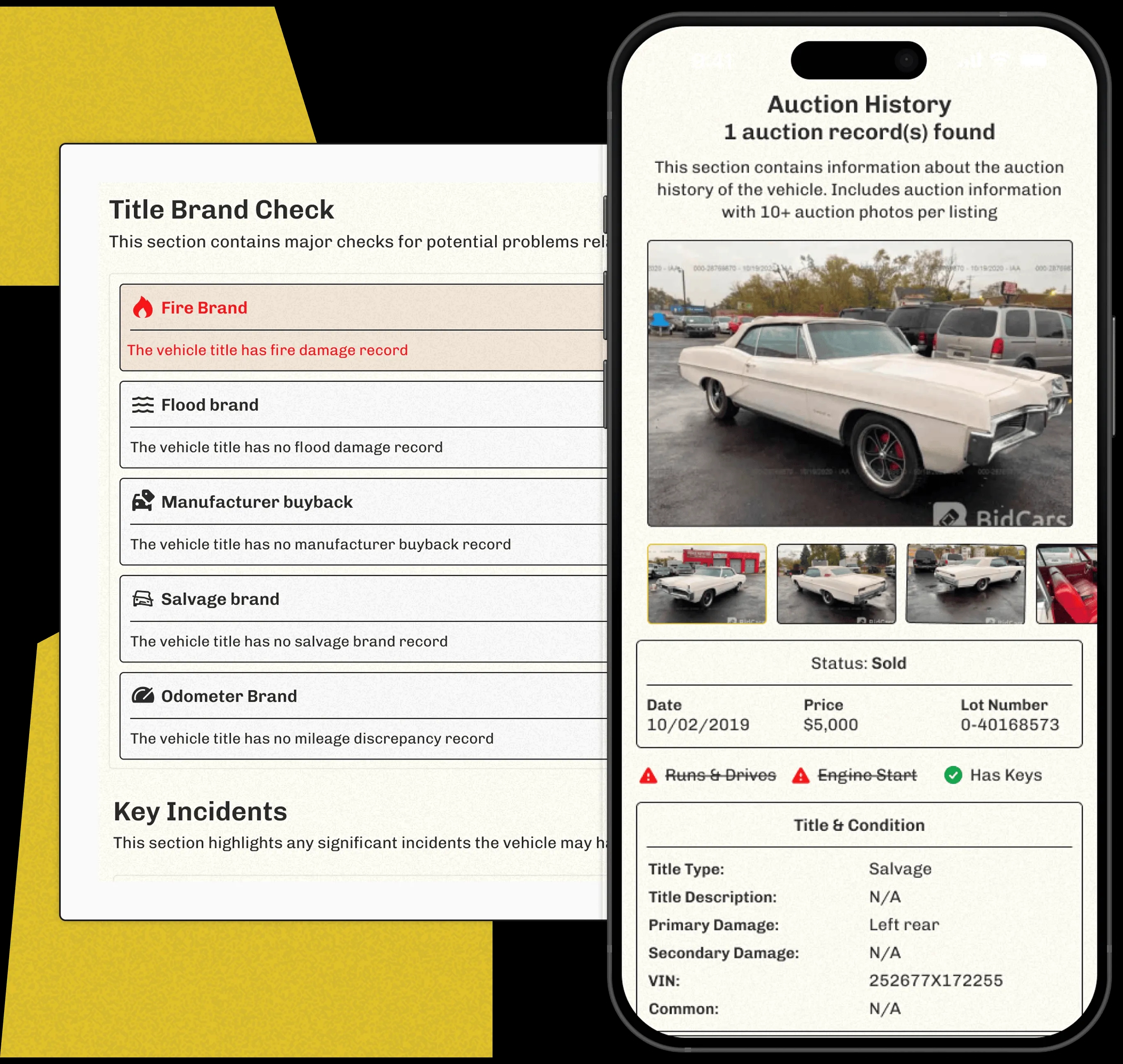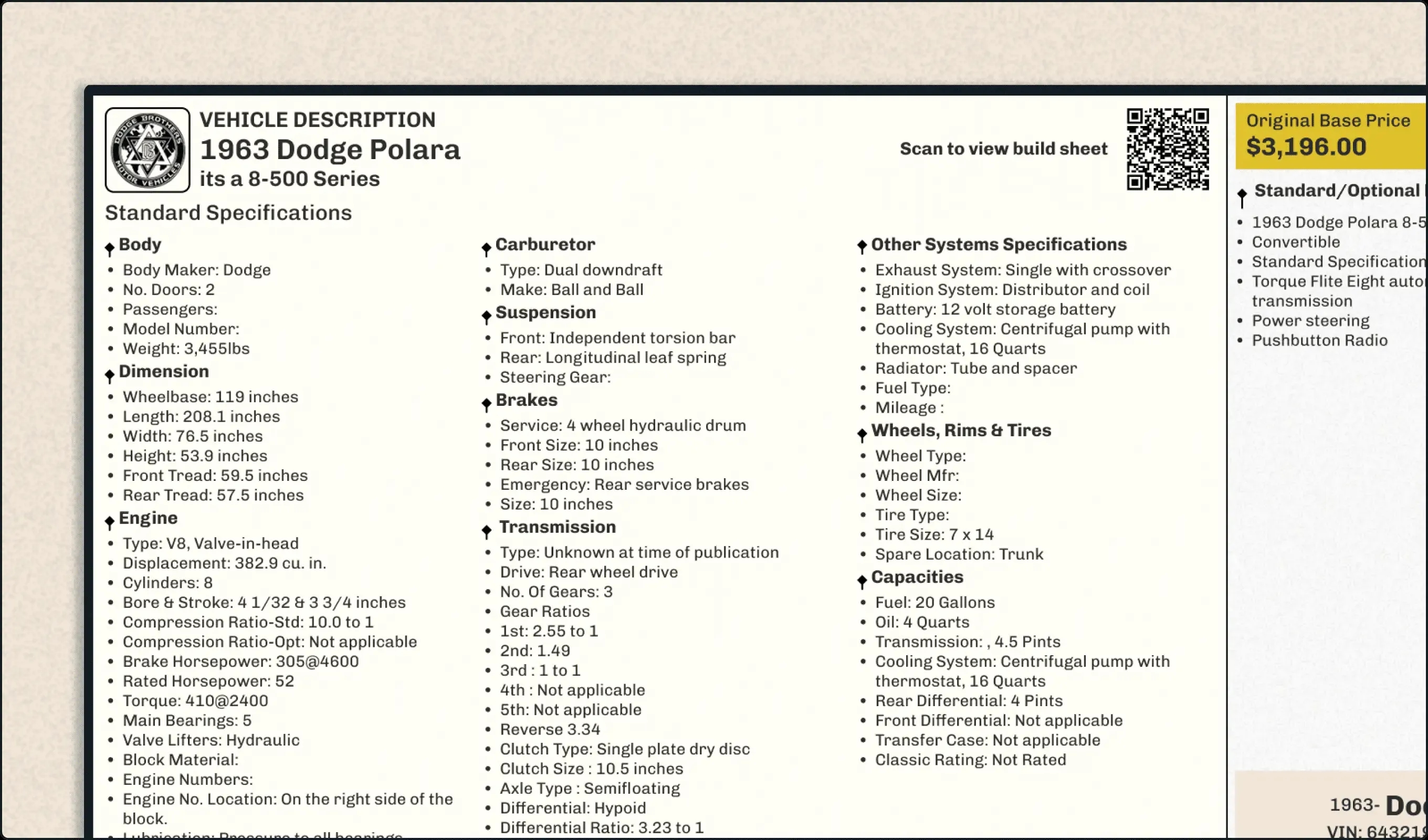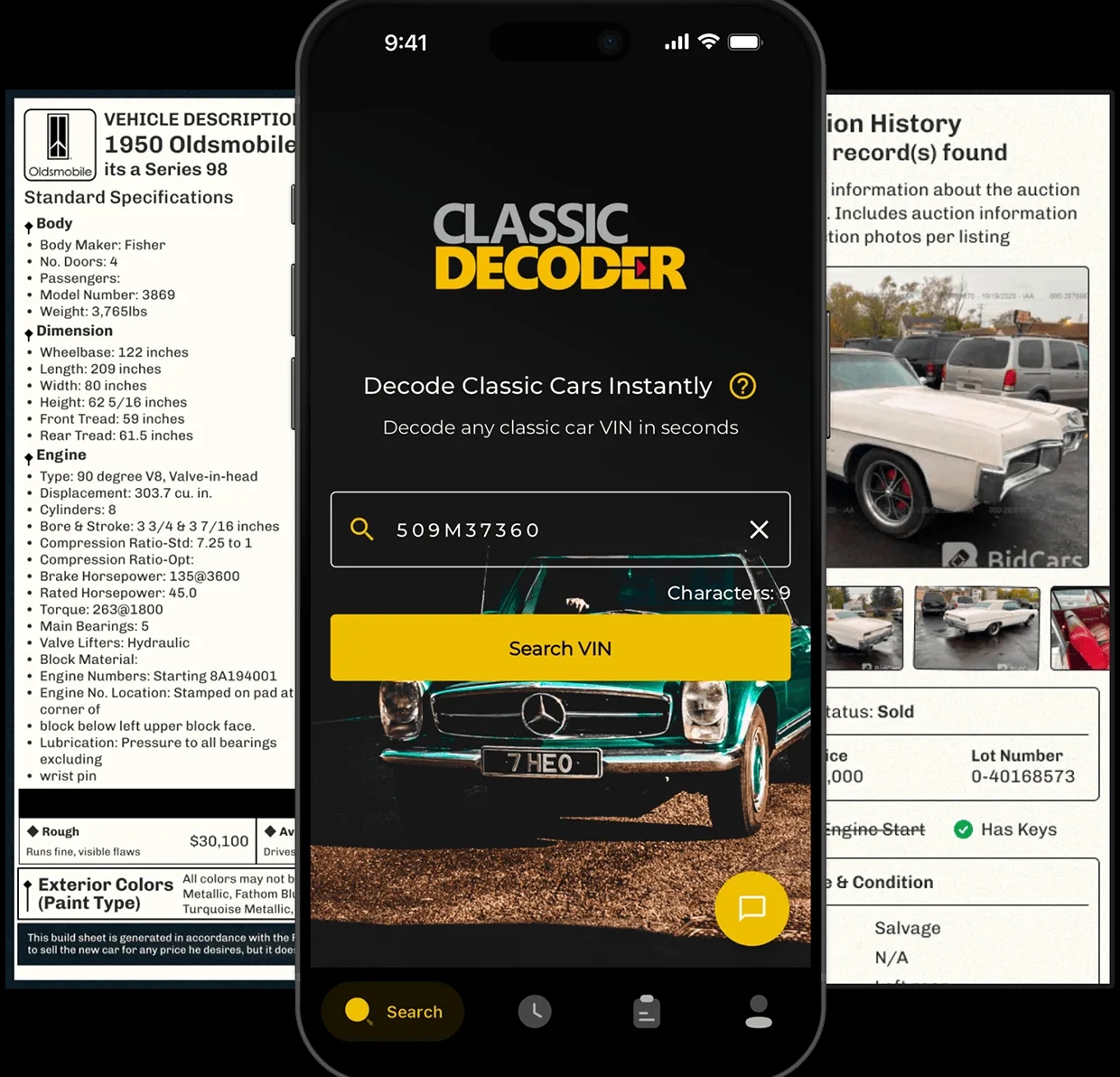1967 Chrysler 300
The '67 Chrysler 300: A muscle car legend! Sleek, powerful, and instantly recognizable with its aggressive stance. A symbol of '60s American excess, it blended luxury and performance, cementing its place in automotive history. Think sharp lines and plenty of chrome—pure cool.
Decode Classic VINs to Get Vehicle History Report and Build Sheet
The Timeless Appeal of the 1967 Chrysler 300
The 1967 Chrysler 300 is more than just a car — it's a cultural icon, embodying the spirit of a transformative era in American history. I'm talking the late 60s, a time when cars weren't just modes of transportation; they were part of the rebellious soul of America. But what makes this classic chariot so special, you ask? Well, let's dive into its rich history, iconic design, and yes, the glamorous figures who've owned one.

1967 Chrysler 300 Models:
Select the vehicle's model to see the correct data for it.
How Much is Chrysler 300 Worth?
Original MSRP :$3,936.00
Outstanding
Clean
Average
Rough
1967 Chrysler 300 Specs
Interested in buying a classic car or selling one?
Access detailed history reports for classic vehicles from hundreds of manufacturers.
- Accident Records
- Theft Records
- Loan & Lien Information
- Auction Information
- Salvage Information and more

History of the 1967 Chrysler 300
Back in the mid-20th century, Chrysler was making waves with its full-size luxury cars, known for their edgy designs and stellar performance. The 1967 model was no different. It emerged during a highly competitive muscle car era, boasting a robust 440 cubic inch V8 engine. This model was Chrysler's ace in the sleeve, reflecting not only American innovation but also a broader cultural shift where cars represented freedom and cool-factor.
Curious to learn more about your own set of wheels? A is a great place to start for car enthusiasts who want to dig deeper into their vehicle's past.
Learn more about a classic car: Get Build Sheet by VIN.
Access reproduced classic build sheets to learn more about your classic vehicle details.
- Standard Specifications
- Original Base Price
- Standard & Optional Equipment
- Exterior & Interior Colors
- VIN ID & Location description

Development and Design
The 1967 Chrysler 300 underwent a snazzy makeover compared to its predecessors. With sleek lines and a bold stance, it captured the zeitgeist of the 60s' aesthetic trends. Its powerful engine lineup was part of Chrysler's strategy in a cutthroat market where everyone - from Ford to Chevrolet - was racing to shape the muscle car narrative. The Chrysler 300 stood tall, not just as a set of wheels, but as art on wheels.
Performance and Popularity
Ah, performance! The Chrysler 300 wasn't just about looks - she could move too. Known for exceptional speed and handling, it became a favorite among car enthusiasts. Popular in racing events, its "Hemi Under Glass" concept dazzled onlookers with its engineering marvels. The fusion of luxury and performance made it a symbol of the 60s — when cars became intertwined with the American notion of identity and freedom.
1967 Chrysler 300 Gallery


Cultural Impact
Fast forward a bit, the Chrysler 300 became a superstar in its own right, gracing the screens of films and televisions. Its sheer presence helped carve its place in pop culture. Today, it remains a beloved classic among aficionados, often appearing at vintage car shows and auctions. Many look to decode the rich history of such cars; that's where a can really come in handy.
Popular Figures Who Own the 1967 Chrysler 300
Owning a classic car like the Chrysler 300 isn't just about having a cool ride; it's about being part of a legendary legacy. Several famous faces have been associated with the 1967 Chrysler 300, helping cement its legendary status. Let's name a few, shall we?
Tom Cruise
Yes, you read that right. When he's not jumping out of planes or riding on motorcycles in his action-packed movies, Tom Cruise has been known to cruise (pun intended) in a Chrysler 300. His ownership adds a touch of Hollywood glamour to the car's legacy.
Kelsey Grammer
Another celebrity who's been linked with this classic beauty is Kelsey Grammer. Known for his sharp and sophisticated roles, Grammer's choice in cars mirrors his on-screen persona — classy and powerful.
Hulk Hogan
And let's not overlook the larger-than-life wrestling superstar Hulk Hogan. Just like Hogan himself, the car is big and bold, a statement piece that demands attention, embodying the same power and prestige.
David Hasselhoff
And who could forget David Hasselhoff? This man practically embodies the 80s and early 90s, and owning a classic 300 is perfectly in line with his flashy personality.
For those curious about these fascinating connections and wanting to explore more details, a offers a full picture of each classic owner's background.
Fun Facts about the 1967 Chrysler 300
Owning a 1967 Chrysler 300 is like holding onto a piece of history. Did you know that many of these cars were used to transport VIP guests, including Meryl Streep and Christina Aguilera at exclusive events? This tidbit only enhances the car's image as a luxury icon.
And if you're looking to verify the authenticity of your classic beauty, perhaps trying a might just ease your doubts.
Interested in Buying or Selling a Classic Car?
Navigating the classic car market can be tricky and you need the right background information to seal the best deal. That's why obtaining a thorough vehicle history report and build sheet is crucial. These documents can provide:
Accident Records
Theft Records
Loan & Lien Information
Auction Information
Salvage Information and more.
For a detailed report, try using Classic Decoder to enhance your buying or selling process.
In conclusion, whether you own a piece of this legacy or yearn to understand it more, the 1967 Chrysler 300 remains a timeless emblem of American automotive history. Its storied past woven with everyday stories and star-studded dreams truly set it apart as a classic worth appreciating. Happy classic car adventures!
Classic VIN Decoder App |Now available on both Android and iOS!
At Classic Decoder, we believe that developing a mobile app is a great way to extend our classic car data solution hub to as many users as possible across the globe. Our app is built with users and precision in mind. It holds the key to unlocking the history and details of any retro car at your fingertips. It also comes with fascinating and user-friendly features that make it stand out from other mobile apps designed for this purpose.
The Classic Decoder app lets you decode and lookup any classic VIN in a flash. Access accurate vehicle information and history, make an informed decision faster, and buy and trade in classic cars with confidence.

Download The Classic Decoder App now.
Some unique features include:
- Support all classic VIN lengths from 5 to 13 digits
- Support classic cars produced from 1910 – 1980
- Online Garage features – to add and manage your vehicles
- 24/7 Customer Support
- Easy onboarding for first-time users
Explore Chrysler 300 from Other Years
Frequently Asked Questions
Well, the '67 Chrysler 300? It's a real head-turner, you know? A real classic. Its defining features? Let's see… the hidden headlights are pretty iconic; they're like a secret weapon, only revealed when needed. Then there's the distinctive, almost aggressive, front grille; it's got that unmistakable Chrysler swagger. And of course, those elegant, flowing lines of the body – they're timeless, really. You wouldn't mistake it for anything else on the road. Plus, you had a choice of some pretty potent engines, making it a real powerhouse for its day.
The 1967 Chrysler 300? She had some serious power under the hood. You could get a 440 cubic inch V8, a real beast, capable of moving mountains... or at least, moving you pretty quickly. Now, some models also had a slightly smaller, but still impressive, 413 cubic inch V8 as well. Think of it like choosing between a really, really big steak or a slightly smaller but still hefty one – both tasty! The performance was something else entirely, though. Either way, it was all about raw power.
The '67 model, in my opinion, represents a refinement of the earlier 300s. It's like a really good bottle of wine – it's aged perfectly and improved over time. While maintaining that signature Chrysler muscle car attitude, it boasted some smoother styling and often had improved handling compared to earlier models. It built upon the legacy, you see, so think of it as an evolution, not a revolution. It wasn't drastically different, but the improvements were definitely noticeable.
Like any classic car, the 1967 Chrysler 300 has its quirks. These beauties are getting up there in age, you know. Common problems? Well, the electrical system can sometimes be finicky; those old wires can get a little temperamental. The braking system also requires regular attention, as you might expect with a car of that era. And always check the carburetor; those can be real headaches. It's really all about preventative maintenance – keeping it regularly serviced is key. Think of it like a fine watch—it needs regular attention to keep running smoothly.
Determining the value of a classic car is tricky; it’s not an exact science, is it? It depends on numerous factors, such as condition, mileage (or lack thereof!), and any modifications. Generally, a 1967 Chrysler 300 in average condition would fetch somewhere between, oh, I'd say $30,000 to $60,000, but it could go higher or lower depending on those factors I mentioned earlier. You really need to consult a classic car appraisal for a more precise evaluation; that's the best route to take. It’s like selling a house—so many things affect the final price.
Finding parts for a classic car can be a bit of a treasure hunt, but there are resources out there. Many online retailers specialize in classic car parts; you can often find parts from specialists, or even through restoration shops who often stock parts. Plus, don't count out your local swap meets and car shows; you might be surprised what treasures you can uncover! So, don’t give up; a little bit of searching will pay off handsomely.

